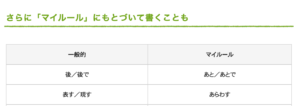I had a student ask about the use of the kanji 後. He noticed that it is not usually used when people would write something like 「あと5秒」In the moment I wasn’t able to give a rule, but from my experience, kanji use varies with the author and time period. My initial thoughts are that kanji use for this particular situation isn’t so much a rule but a stylistic choice, determined by the trend of the times or authors style and need for emphasis or variation.
A fun reason to dive in and figure out if such rule does exist.
According to this website a simple explanation was given to the use of when and when not to use the word in kanji.
![]()
The rule given here is linked to the reading of the kanji. The rule explains, only when using the 「ご」reading should the kanji be used. I had to dig pretty deep to find it, but interesting to see that someone feels the need to state that a rule like this should exist. I’m still not convinced that it is in fact an actual rule.
Another website gives a full gauntlet on the use of 後 in a variety of sentences, but fails to give any details if there is an appropriate time to use it in kanji or hiragana. Interestingly, the author seems to make a distinction in the use of the kanji or not. The author seems to not use あと when using the vocabulary word to list things or numbers. I’ve noticed native speakers of Japanese do something similar using the term as a past participle. However, I don’t know if this is a conscious effort, subconscious happening, a social trend, or just coincidence…
Kotobank, which compiles and compares terms searched from newspapers, dictionaries, and other published materials, does not mention anything about the use or non use of the word in kanji.
In this post published by Hajimete Web, a CMO for an online corporation Takahiro Mashiko states that there exists a category of my rules that determine the use of 後 in kanji.

The first term listed is our point of contention, 後. He explains this as a category of writings for a blog, twitter post, or facebook posts.
I made one final search on the topic using Google trends, this compared the two key words 後 and あと. The results are shown in the graph below:
The comparison of search terms over the last year in Japan shows an over whelming amount of searches using the kanji compared to the the same word in hiragana. This has its limits, in that it doesn’t define how the word is being used (part of speech), but in general you could say that the word is used with the kanji with almost 8x the frequency.
If there is any rule, then it is in the use of the word as a past participle (where the verb is used as an adjective). あと5分です。(There is 5 minutes left). In this case the katakana is often used. Why…. I don’t know. Perhaps because the word あとcan be exchanged for 残り, which might help us actualize the word acting as a verb, where left can be substituted with remaining. Native speakers of Japanese probably subconsciously make this switch, but I don’t believe there is an actual rule in existence.
Aside from a few generalizations about the use of kanji in formal and informal settings, there seems to be little to no evidence of a rule that explains whether or not to use kanji. In general the use of the term with kanji seems common unless the term is being used as a “past participle” essentially a verb acting as an adjective.